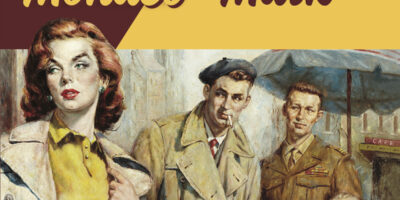Death and dark revelations surface when a visiting Chicago Homicide Department chief revives interest in an unsolved 20-year-old murder case, and a snooping Omaha businessman plays amateur sleuth while on holiday.
Between 1949 and 1955, Bernice Carey Martin wrote eight critically acclaimed mystery novels set in California, all published by Doubleday & Company, using the name Bernice Carey. A number of these gripping whodunits were praised highly in The New York Times and went on to become bestsellers, with one adapted for television.
Curiously, despite her success and her unmistakable talent for crafting intelligent, absorbing mysteries filled with authentic townsfolk and credible character development, Carey’s literary career fell eerily silent after 1955, even though she lived for a further 35 years.
Fortunately, two of Carey’s much-admired but long-forgotten novels are finally back in print for the first time in over 60 years, published together in a new combined edition.
The Man Who Got Away With It, initially released in 1950, is a powerful psychological drama written with great literary flair, exploring lust and repression, discrimination and middle-class snobbery, and irrepressible psychopathic impulses.
It begins with a frivolous discussion at a dinner party about the ‘baffling’ strangling of a loose young woman twenty years earlier in the ‘nice, peaceful little town’ of Los Alegres and the lingering, unpleasant concern that among the ‘quiet, respectable, conscientious’ community residents, a predatory killer roams free.
Veteran police inspector Roy Malley, vacationing from Chicago, is a naturally suspicious yet intuitive man, capable of detecting true ‘menace’ in the seemingly innocent behaviours of those around him. Believing he could have unmasked the culprit had he been in charge of the investigation, he starts looking into the cold case and questioning the town’s long list of suspects.
The more Malley probes, the more mistrustful he becomes of one inhabitant in particular – a ‘model citizen, model husband, model father’ whose ‘propitiatory’ behaviour toward his wife persuades Malley that something sinful may have occurred to make him feel the need to act this way.
With nothing but intuition to go on, Malley can do little but watch and wait, certain that the man he suspects will experience once more ‘the psychological need to indulge in the stimulant of danger’ and this time leave behind some incriminating evidence.
Riveting and astutely written, The Man Who Got Away With It showcases Carey’s remarkable ability to get inside the minds of her many varied characters and convincingly present small-town community conflicts and sentiments of the era.
In contrast, the second novel in this collection, The Three Widows, first published in 1952, is a light, tongue-in-cheek murder mystery that is laughingly farfetched, and yet fun, likable, and thoroughly entertaining.
When retired Nebraskan businessman Mel Bladeswell, who is touring the Californian coastline with his wife, hears about the suspicious death of an unidentified middle-aged man on the beach in Santa Cruz, it sets his overactive mind thinking back to unexplained deaths in Yellowstone Park and Yosemite during his previous summer vacations.
Then he reaches Escondido, a little resort in the hills between the San Simeon Highway and the city of San Luis Obispo, for an arranged one-week break with his childhood friend from Omaha, Chet Hoffman. And there, the Bladeswells encounter three mature women vacationers, each one a recent widow, all of whom appear to have designs on the ‘prosperous,’ personable, eligible Chet.
Something doesn’t seem right to Mel, and suddenly his imagination starts running wild. Could one of these flirtatious, unfettered women possibly be a practised husband killer?
Relying on his fine ‘powers of observation and his ability to put two and two together,’ Mel starts to play detective by prying into their lives, surreptitiously searching their cabins and their belongings for clues and, ultimately, landing himself in a whole heap of trouble.
Although Carey’s fanciful tale may stretch the long arm of coincidence to extremes, the attractive setting, brisk pace and intriguing set-up make this one a compelling read.
(Stark House Press, paperback, £15.95)
My review of Bernice Carey’s powerful psychological drama The Man Who Got Away With It and tongue-in-cheek whodunit The Three Widows was published in the Lancashire Post on May 20, 2019, and syndicated to 25 newspapers across the UK. Archived online access to these reviews as they originally appeared, featuring my byline, can be found at these weblinks:
Blackpool Gazette; Burnley Express; Chorley Guardian; The Clitheroe Advertiser and Times; Fleetwood Weekly News; Garstang Courier; Lancashire Post; Lancaster Guardian; Leigh Observer; Leyland Guardian; Longridge & Ribble Valley News and Advertiser; Lytham St. Annes Express; Pendle Today (Nelson Leader; Colne Times; Barnoldswick and Early Times); The St. Helens Reporter; The Visitor (Morcambe); Wigan Today (Wigan Post; Wigan Observer).



